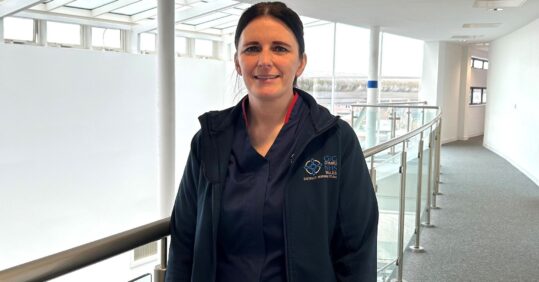New role to support district and wound care nurses’ wellbeing in Swansea

A health board in Wales has appointed its first professional nurse advocate (PNA) to support and guide district nurses and wound care nurses to build personal and professional resilience.
Formerly the interim transformational lead for district nursing, Catrin Codd has taken on the PNA role at Swansea Bay University Health Board to help support nurses’ wellbeing and strengthen the workforce.
The role, which was first launched in England in 2021, aims to provide support to colleagues through restorative clinical supervision (RCS) sessions, where staff can talk about their role or any issues they may be facing and find a solution.
Nurses are able to refer themselves or their managers can refer them to the sessions, which can either be held in a one-to-one or group capacity.
Ms Codd’s PNA role is split into four parts around recruitment, staff retention, quality improvement and professional development, and is specifically for district nurses and wound care nurses.
Related Article: Nurses must be ‘recognised and rewarded’ to say in profession, says Streeting
‘It’s not about solving people’s problems but rather, talking them through and then helping them to come to a conclusion themselves about how they are going to tackle the problem,’ she said.
The RCS sessions will ‘also help to support staff with education and helping them to upskill’.
Group sessions have already begun, and it is hoped that those who attend can consider other colleagues’ perspectives to help inform their decision making, the health board said.
The quality improvement element of the PNA role ‘is about looking at the service as a whole and seeing how we can make improvements’, added Ms Codd.
‘That will also be done through the RCS sessions, where some staff may bring up an issue and question why we do things a certain way and discuss other ideas.
‘They could be improvements that we wouldn’t know about unless we had these conversations.
‘It’s about trying to make things easier for staff so they are happy within their role.’
Ms Codd added: ‘The purpose of the RCS is to address the emotional needs of staff and support resilience in the workplace.
Related Article: Investigations into whistleblowing at NMC delayed and recommissioned
‘If staff are happy, they are likely to be more productive which creates a better outcome for our patients.
‘The more support our workforce has through supervision, career development and quality improvement the better able they are to provide effective care.’
Catherine Davies, deputy head of nursing for the health board’s primary community therapies group, said: ‘Catrin’s role will give staff the opportunity to have protected time to share and discuss what is relevant to them, with the aim that RCS will improve individual staff and team health and wellbeing.
‘Catrin will be working alongside the teams to feed into the patient experience, patient safety and quality improvement work underway within primary and community care.’
Paula Heycock, head of nursing for the health board’s primary community therapies group, added: ‘We have introduced this new PNA role as a creative approach towards diversifying our workforce to support staff wellbeing, recruitment, retention and succession planning.
Related Article: One in five appointments in general practice completed by a nurse
‘The intention is for this role to give staff a platform to be heard and a voice to be listened to in a very clear and structured way.
‘We are challenging the traditional models, methods and structures of nursing services, to include new innovative ways of working.’
He added: ‘We will be measuring the impact in terms of staff retention, sickness levels and career development, and are optimistic the PNA role will have a positive effect.’

See how our symptom tool can help you make better sense of patient presentations
Click here to search a symptom




